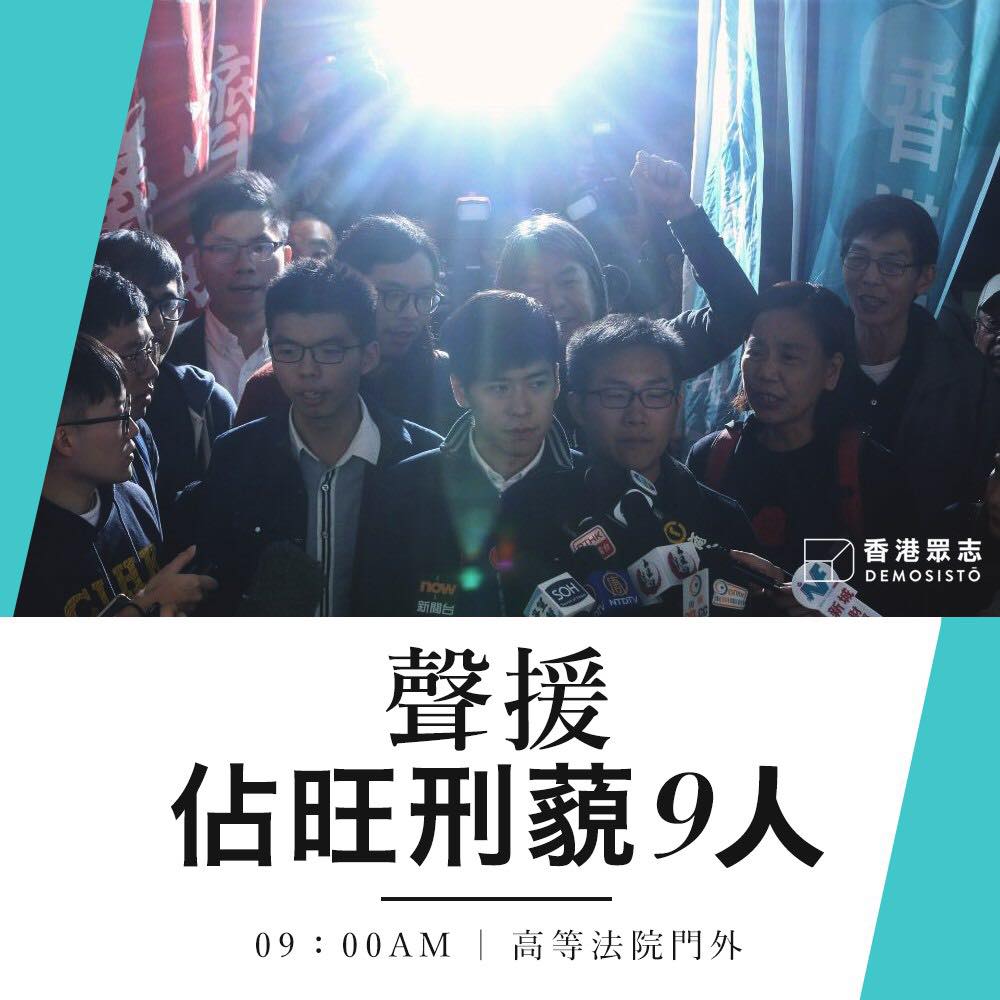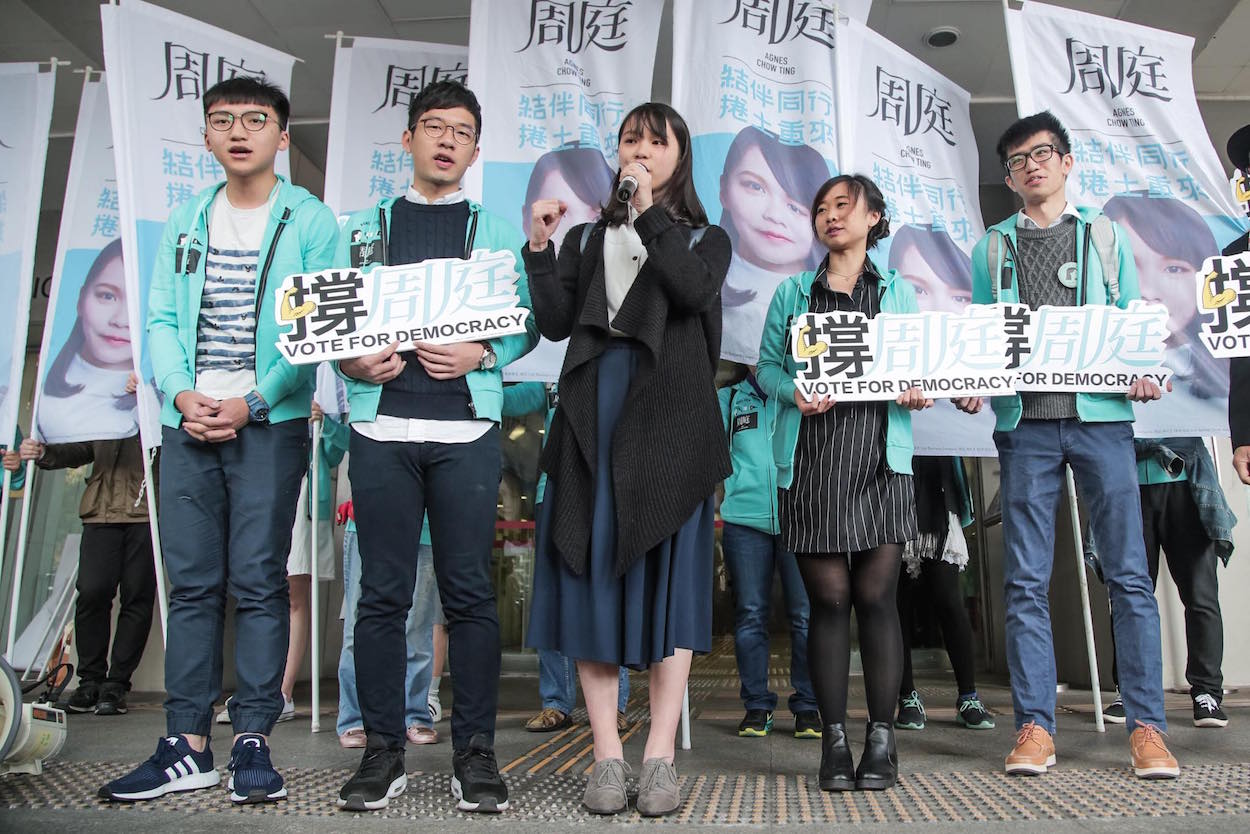by Brian Hioe
語言:
English
Photo Credit: Agnes Chow Ting/Facebook
THE ARREST OF leading Umbrella Movement figure Joshua Wong in Hong Kong, alongside other Umbrella Movement activists, probably surprises few. In particular, while Wong is currently out on bail from a six month jail sentence related to the Umbrella Movement, Wong was sent back to jail on a second set of charges, regarding Wong being held responsible for failing to comply with a police order to clear the Mong Kok encampment in Mong Kok.
Wong is likely the most recognizable figure of the Umbrella Movement and so it is not surprising that Beijing would target Wong as a way to discourage future political dissent in Hong Kong. However, in both set of charges, other leading figures of the Umbrella Movement have also been sentenced to jail.
For example, in the first set of charges he faced, Wong was arraigned with Alex Chow, the secretary-general of the Hong Kong Federation of Students during the Umbrella Movement, and Nathan Law, formerly Hong Kong’s youngest lawmaker before being disqualified from office as part of an oath-taking row used as pretext by Beijing to remove dissident lawmakers. In the second set of charges, Wong was sentenced alongside Lester Shum, the deputy secretary-general of the Hong Kong Federation of Students, and another well-known youth activist.
 Press conference announcement by Demosisto regarding the arrests. Photo credit: Demosisto
Press conference announcement by Demosisto regarding the arrests. Photo credit: Demosisto
Apart from these two cases, 13 Hong Kong activists were also recently sentenced to jail for an attempted occupation of Hong Kong’s Legislative Council in June 2014 against a 340 million HKD funding plan to develop Hong Kong’s New Territories that was forced through by Finance Committee chair Ng Leung-sing at a meeting in which no pan-Democratic legislators were present. This was a set of conditions reminiscent of the situation which led to the Sunflower Movement in Taiwan, which had taken place two months prior, and the action of attempting to storm Hong Kong’s Legislative Council was likely in imitation of the Sunflower Movement doing so for Taiwan’s Legislative Yuan.
As should go without saying, Beijing’s restrictions on political freedoms in Hong Kong are increasingly severe. Apart from arresting political dissidents, there are also cases in which pro-Beijing mobs have possibly been paid by the Chinese government to physically attack protesters, and cases in which political dissidents have been “disappeared” from within Hong Kong to reappear within China, confessing to lurid past crimes. Furthermore, Hong Kong’s democratic system is basically nonexistent at this point, with legislators able to be prevented from running in elections, or disqualified from legislature after winning an election because Beijing decides that they have crossed the line in terms of refusing to comply with its will. In the case of Nathan Law, such disqualified legislators can further be arrested.
It may be a question for Hong Kong’s democracy movement as to what the next steps to be taken are in the face of such repression. In many cases, democratic activists seem at a loss. Following the disqualification of high-profile localists such as Yau Wai Ching and Baggio Leung, the localist camp, which called for more radical actions, seems in many ways to have lost much of its public reputation, and this may have had a dampening effect on calls for radical action more generally.
On the other hand, the “mainstream” of the Umbrella Movement seems to have taken the step of attempting to continue to try and participate in elections even if this likely will result in disqualification or even arrest as a way of escalating the political stakes regarding what is left of electoral democracy in Hong Kong.
 Agnes Chow, center, while campaigning. On her left is Nathan Law. Photo credit: Agnes Chow Ting/Facebook
Agnes Chow, center, while campaigning. On her left is Nathan Law. Photo credit: Agnes Chow Ting/Facebook
For example, Agnes Chow, another prominent figure of the Umbrella Movement and another member of the Demosisto political party that Wong and Law are part of, is currently running for a by-election to replace Law in his electoral district. At age 21, Chow would supersede Law as Hong Kong’s youngest lawmaker in history in the case of victory. But it is highly possible that Chow will be either prevented from running, could be disqualified, or arrested.
Edward Yiu, who was one of the disqualified lawmakers, is also among those running, seeing as he was previously a lawmaker from a functional constituency appointed by professional interest groups, representing the architectural, surveying, planning and landscape functional constituency. However, Yiu, by trade a professor, will instead be running to represent an electoral district, which is why he is not barred from the election process. But Yiu, similarly, faces the possibility of being prevented from running, disqualified, or arrested on some set of charges.
It remains to be seen as to what other tactics may be adopted by democratic activists in Hong Kong in the future. Nevertheless, it will also be seen whether political jailings by China and other similar tactics will have a dampening effect on activism in Hong Kong, as would not be surprising. Desperate times seem set to continue in Hong Kong.

